[caption id="attachment_1075" align="aligncenter" width="599"]
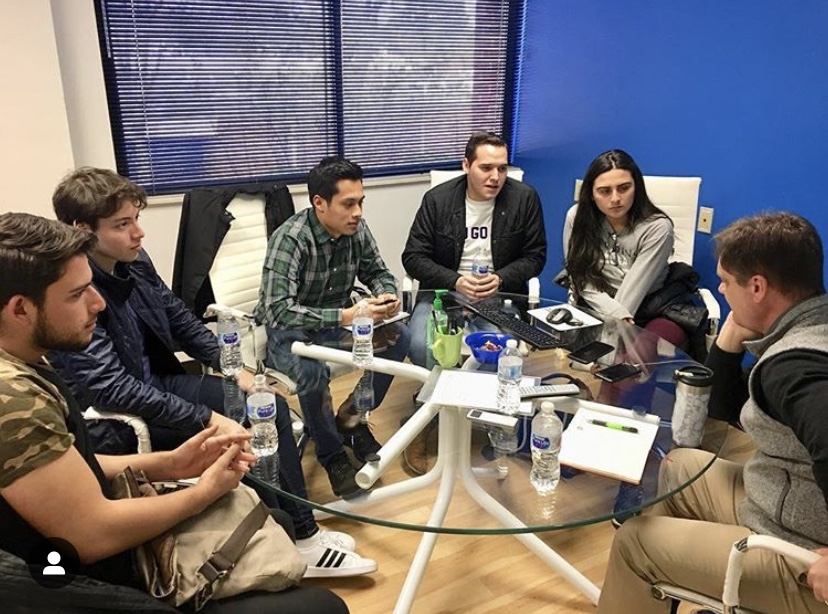 L-R: Zuniga, Navarrete, Cruz, Rojas, and Escobar and faculty member Jon Wood[/caption]
Fintech startup Monity is the embodiment of the
Walton Scholarship
vision: Combining the foundation’s investment in educational opportunity with hard work and persistence, Walton Scholars are charged to return home with a vision to make meaningful contributions to the region. The founding members of Monity are computer engineering major Michael Cruz of Belize, international business major Roxana Escobar of El Salvador, management information systems major Andres Rojas of Costa Rica, and software development major Jhoel Zuñiga of Costa Rica. Recently, computer science major Pedro Navarrete from Nicaragua came aboard to assist with web development.
We remember the first meeting of last year’s
Arkansas Governor’s Cup
business plan competition teams, at which students explained their ideas to faculty and answered questions about the viability of their business model.
At a corner table sat four Latin American students, intently explaining their vision for a blockchain-based money transfer system for the developing world, where millions of foreign workers pay high fees to send money to unbanked families across national borders.
We were impressed with their quiet commitment. CEO Michael Cruz established the need by describing a ledger his father had shared with him. It contained a record of his wages and of all the money he had transferred from his remote employment location back to his family. The total in transfer fees he had paid over the years seemed staggering, and that revelation planted the seed for Monity.
[caption id="attachment_1085" align="alignright" width="229"]
L-R: Zuniga, Navarrete, Cruz, Rojas, and Escobar and faculty member Jon Wood[/caption]
Fintech startup Monity is the embodiment of the
Walton Scholarship
vision: Combining the foundation’s investment in educational opportunity with hard work and persistence, Walton Scholars are charged to return home with a vision to make meaningful contributions to the region. The founding members of Monity are computer engineering major Michael Cruz of Belize, international business major Roxana Escobar of El Salvador, management information systems major Andres Rojas of Costa Rica, and software development major Jhoel Zuñiga of Costa Rica. Recently, computer science major Pedro Navarrete from Nicaragua came aboard to assist with web development.
We remember the first meeting of last year’s
Arkansas Governor’s Cup
business plan competition teams, at which students explained their ideas to faculty and answered questions about the viability of their business model.
At a corner table sat four Latin American students, intently explaining their vision for a blockchain-based money transfer system for the developing world, where millions of foreign workers pay high fees to send money to unbanked families across national borders.
We were impressed with their quiet commitment. CEO Michael Cruz established the need by describing a ledger his father had shared with him. It contained a record of his wages and of all the money he had transferred from his remote employment location back to his family. The total in transfer fees he had paid over the years seemed staggering, and that revelation planted the seed for Monity.
[caption id="attachment_1085" align="alignright" width="229"]
 Monity CEO Michal Cruz[/caption]
Monity’s collaboration began the week they first arrived in Arkansas. Zuñiga and Cruz met on a campus bus on a Walton Scholars trip to Walmart. They discussed their dreams of creating a business and returning to help their countries. Their first attempt didn’t end as they’d hoped; they spent six months developing a video game, but soon realized they needed team members with solid business skills. “We launched the game, but people would play for a while, but when players didn’t see a critical mass of users, they would drop off.” They sidelined the game and looked for partners.
Monity CEO Michal Cruz[/caption]
Monity’s collaboration began the week they first arrived in Arkansas. Zuñiga and Cruz met on a campus bus on a Walton Scholars trip to Walmart. They discussed their dreams of creating a business and returning to help their countries. Their first attempt didn’t end as they’d hoped; they spent six months developing a video game, but soon realized they needed team members with solid business skills. “We launched the game, but people would play for a while, but when players didn’t see a critical mass of users, they would drop off.” They sidelined the game and looked for partners.
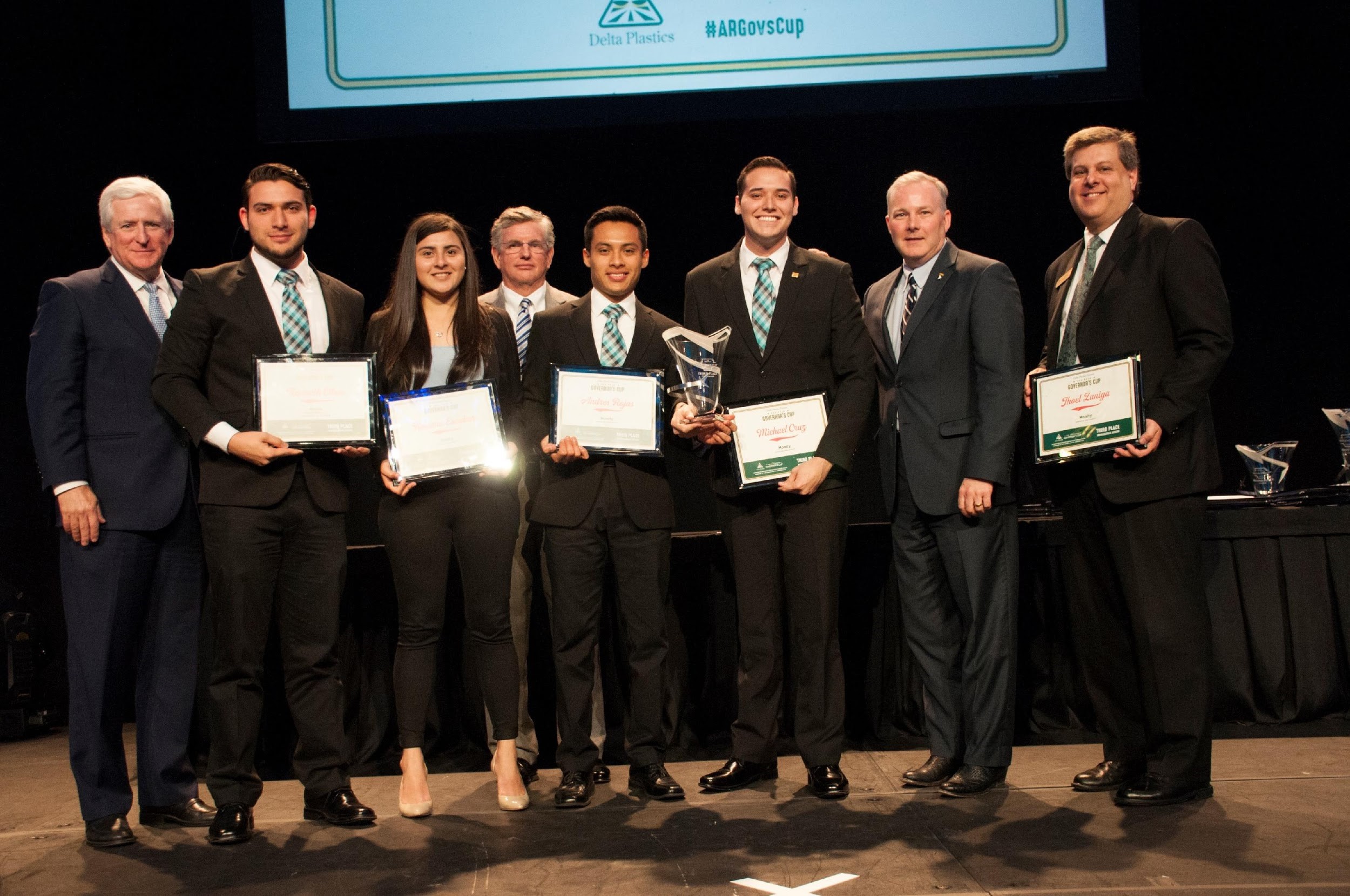 Rush Deacon of Arkansas Capitol, Zuniga, Escobar, Dhu Thompson, Cruz, Rojas, Lt. Gov. Tim Griffin, Ken Olree. Photo: Arkansas Capital
They soon added Rojas, who was, as Cruz said, “all about big data.” Then they began trying to identify an important problem to solve. The team considered a digital wallet, but eventually settled on money transfers. “And we asked who else could align themselves with our dreams?” Cruz said. They needed marketing expertise, and Cruz knew Escobar had big dreams for things she wanted to do. With their team in place, they used the Governor’s Cup competition as a concentrated effort to move their vision forward. The strategy was successful: Monity was well-received at the Governor’s Cup Competition, taking third place and a $10,000 cash prize.
[caption id="attachment_1074" align="alignright" width="210"]
Rush Deacon of Arkansas Capitol, Zuniga, Escobar, Dhu Thompson, Cruz, Rojas, Lt. Gov. Tim Griffin, Ken Olree. Photo: Arkansas Capital
They soon added Rojas, who was, as Cruz said, “all about big data.” Then they began trying to identify an important problem to solve. The team considered a digital wallet, but eventually settled on money transfers. “And we asked who else could align themselves with our dreams?” Cruz said. They needed marketing expertise, and Cruz knew Escobar had big dreams for things she wanted to do. With their team in place, they used the Governor’s Cup competition as a concentrated effort to move their vision forward. The strategy was successful: Monity was well-received at the Governor’s Cup Competition, taking third place and a $10,000 cash prize.
[caption id="attachment_1074" align="alignright" width="210"]
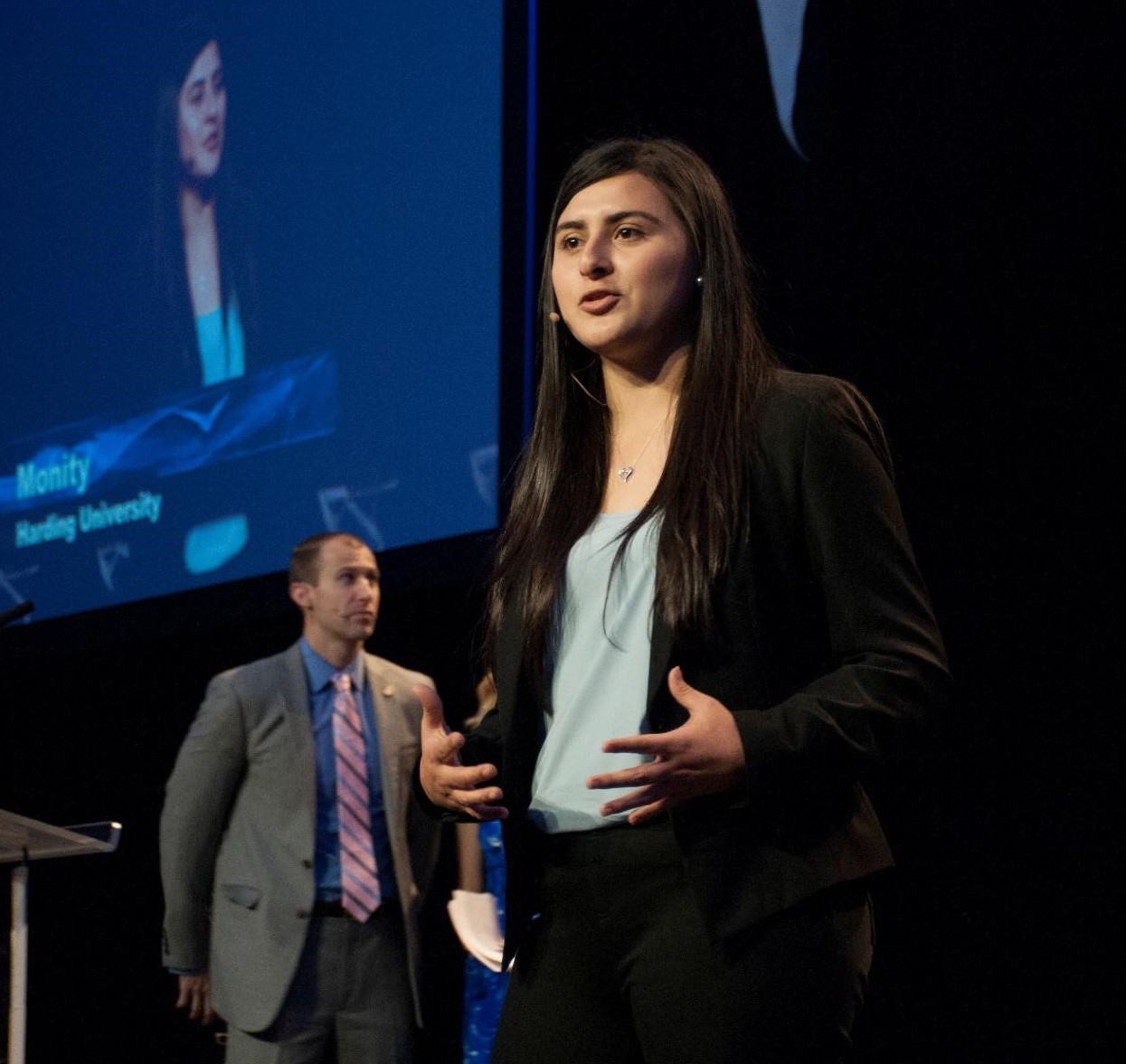 Roxana Escobar presents Monity's 90-second pitch at the Governor's Cup luncheon. Photo: Arkansas Capital[/caption]
In the fall, Monity was accepted into the Delta I-Fund, an early stage, proof-of-concept business accelerator formed to train entrepreneurs administered by Winrock International. Each startup is matched with a mentor, completes 12 weeks of rigorous training, and receives $5,000 in technical assistance or access to seed-stage capital. The experience helped them refine their business model.
Although Monity originally targeted money transfers from laborers in Costa Rica to unbanked families in Nicaragua, political instability delayed a planned market research trip last summer and led to the devaluation of the Nicaraguan currency. The team now views that complication as a blessing. Confronting the political risks led them to modify their strategy. “During the course of the Delta I-Fund, we decided our initial target market needed to change,” explained Escobar.
[caption id="attachment_1078" align="alignleft" width="309"]
Roxana Escobar presents Monity's 90-second pitch at the Governor's Cup luncheon. Photo: Arkansas Capital[/caption]
In the fall, Monity was accepted into the Delta I-Fund, an early stage, proof-of-concept business accelerator formed to train entrepreneurs administered by Winrock International. Each startup is matched with a mentor, completes 12 weeks of rigorous training, and receives $5,000 in technical assistance or access to seed-stage capital. The experience helped them refine their business model.
Although Monity originally targeted money transfers from laborers in Costa Rica to unbanked families in Nicaragua, political instability delayed a planned market research trip last summer and led to the devaluation of the Nicaraguan currency. The team now views that complication as a blessing. Confronting the political risks led them to modify their strategy. “During the course of the Delta I-Fund, we decided our initial target market needed to change,” explained Escobar.
[caption id="attachment_1078" align="alignleft" width="309"]
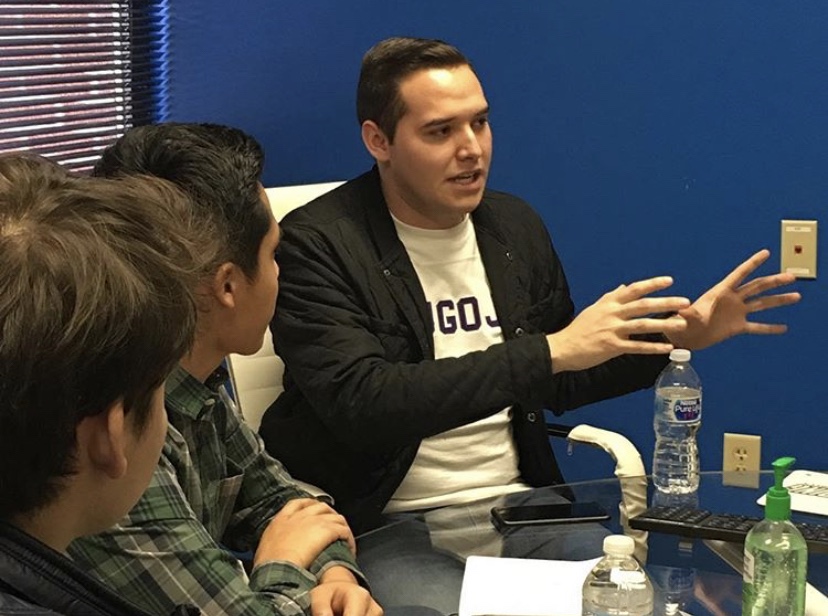 Senior management information systems major Andres Rojas consults with an expert on regulatory issues.[/caption]
“The exchange rate was always the big unknown in the equation.” said Rojas. “The U.S. dollar is the official currency of El Salvador. With El Salvador as our beachhead market, Monity will start out lighter on our feet. Also, our original target market was unbanked individuals but the individuals who are sending money out of the U.S. are mostly younger people, more accustomed to working with banks.”
“Our entry point now is the United States-to-El Salvador corridor.” said Cruz. “Salvadorans are the largest population, after Mexico, transferring money from the U.S. to Latin America. That market is not saturated. Every other player in this industry targets Mexico.”
The team realized that, given the demographics and attrition, an ever-increasing percentage of their customers will have a relationship with a bank. They predict they eventually will be able to serve unbanked customers as well, however.
“We mainly talk about people sending money back to families in Latin America, but there would also be utility for individuals such as foreign students in universities, for NGOs and missionaries, and for populations all over the developing world,” Zuñiga noted.
Cruz notes that the traditional U.S. companies in the money transfer sector have not created a relationship of trust with the market. “People go to those companies because there is nothing else.” Monity believes a close affinity with the people of the market will offer a loyalty and intuition advantage in marketing the service. “Monity wants to step into that market and develop a relationship of trust we can use to educate users and eventually provide jobs that will help move the entire economy forward.”
In the meanwhile, the team admits Monity is an all-consuming preoccupation, invisible to most faculty and students. “When I finish with my classes and see people on Netflix,” Cruz says, “I am thinking how I wish I had all that time to devote to Monity.” Rojas nods, “I often wish I could split myself in two!” They are remarkably intentional, and their dedication comes from having their collective eye on a goal. The entire group affirms that they’ve had to learn to self-regulate; making sure they get enough sleep while getting coursework done and meeting their obligations to the Delta I-Fund and other Monity-related tasks.
[caption id="attachment_1073" align="alignleft" width="330"]
Senior management information systems major Andres Rojas consults with an expert on regulatory issues.[/caption]
“The exchange rate was always the big unknown in the equation.” said Rojas. “The U.S. dollar is the official currency of El Salvador. With El Salvador as our beachhead market, Monity will start out lighter on our feet. Also, our original target market was unbanked individuals but the individuals who are sending money out of the U.S. are mostly younger people, more accustomed to working with banks.”
“Our entry point now is the United States-to-El Salvador corridor.” said Cruz. “Salvadorans are the largest population, after Mexico, transferring money from the U.S. to Latin America. That market is not saturated. Every other player in this industry targets Mexico.”
The team realized that, given the demographics and attrition, an ever-increasing percentage of their customers will have a relationship with a bank. They predict they eventually will be able to serve unbanked customers as well, however.
“We mainly talk about people sending money back to families in Latin America, but there would also be utility for individuals such as foreign students in universities, for NGOs and missionaries, and for populations all over the developing world,” Zuñiga noted.
Cruz notes that the traditional U.S. companies in the money transfer sector have not created a relationship of trust with the market. “People go to those companies because there is nothing else.” Monity believes a close affinity with the people of the market will offer a loyalty and intuition advantage in marketing the service. “Monity wants to step into that market and develop a relationship of trust we can use to educate users and eventually provide jobs that will help move the entire economy forward.”
In the meanwhile, the team admits Monity is an all-consuming preoccupation, invisible to most faculty and students. “When I finish with my classes and see people on Netflix,” Cruz says, “I am thinking how I wish I had all that time to devote to Monity.” Rojas nods, “I often wish I could split myself in two!” They are remarkably intentional, and their dedication comes from having their collective eye on a goal. The entire group affirms that they’ve had to learn to self-regulate; making sure they get enough sleep while getting coursework done and meeting their obligations to the Delta I-Fund and other Monity-related tasks.
[caption id="attachment_1073" align="alignleft" width="330"]
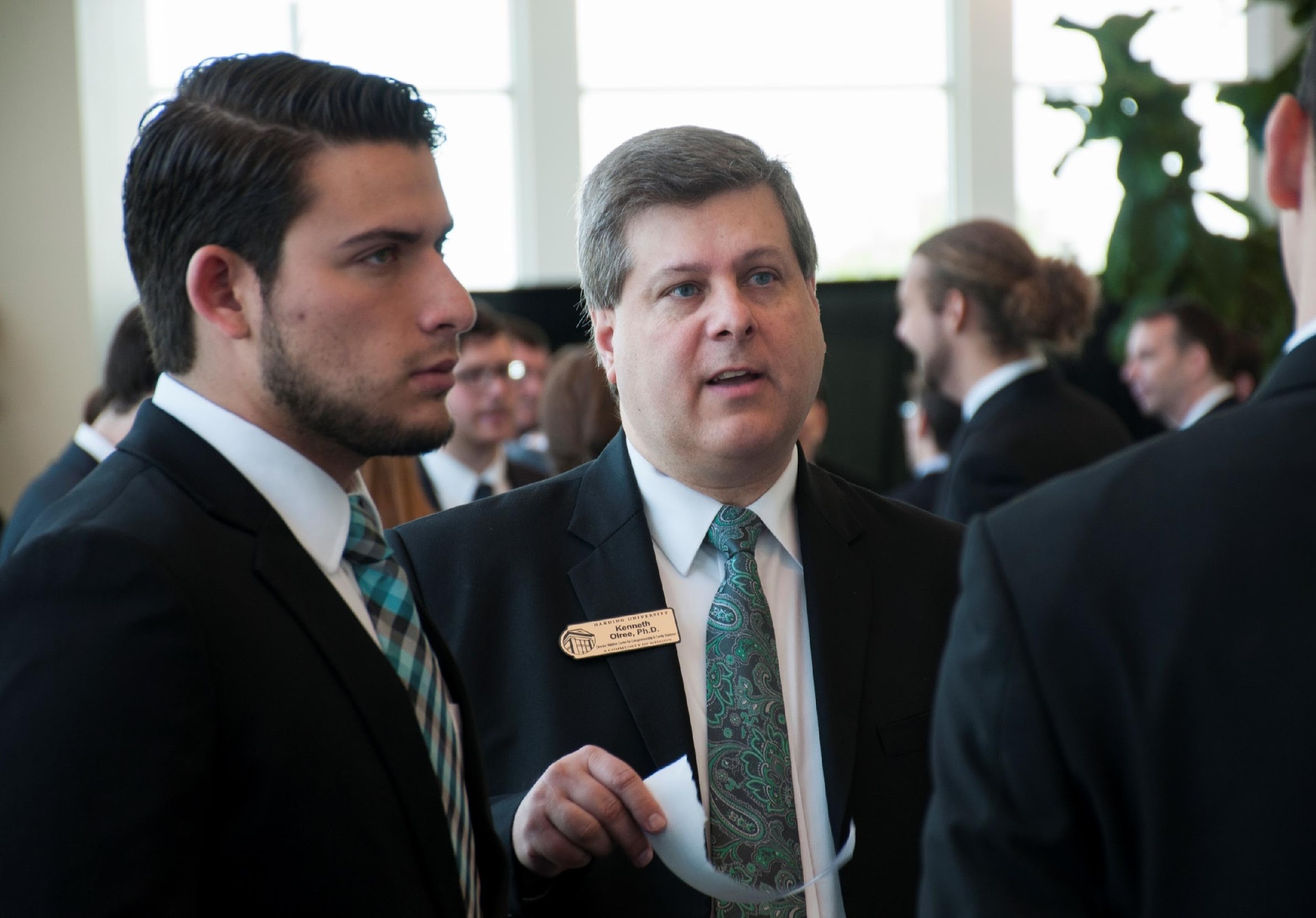 Software development major Jhoel Zuniga and Dr. Kenneth Olree discuss presentations at the 2018 Arkansas Governor's Cup luncheon in Little Rock. Photo: Arkansas Capital[/caption]
So what’s the next hurdle? Cruz takes a deep breath. Transfer licenses are the elephant in the room right now. Monity requires money transfer licenses from all fifty states, and license costs vary widely from state to state. California, where the Salvadoran concentration is greatest, is the most expensive: licensees must have $250,000 in collateral. So having an affiliate bank who already has the license structure in place might be an ideal strategy.
So what happens after graduation?
Cruz is developing a tourism side hustle—a website to organize tours of Mayan ruins near his home in Belize. He and his sister will launch that while he continues his efforts to raise Monity from the ground. The others will continue to collaborate remotely while they are employed elsewhere, traveling as needed.
The vision for Monity has a long arc. “We are not only trying to help people economically—we intend to help educate them financially, to incorporate them into the formal financial system,” said Escobar. And the team believes that connecting unbanked citizens to the financial infrastructure can have ripple effects and could lead to more political and economic stability in the region over time.
A rising tide lifts all boats—bringing us back to the original vision of the
Walton Scholarship
, which for a quarter century has been “creating life-changing opportunities, championing faith and empowering young minds to initiate meaningful impact across Central America and Mexico.”
As they approach graduation, the Waldron Center would like to assist these award-winning students in identifying a network to help move their vision forward. If you have contacts in banking, or if you are interested in learning more or helping to fund next steps, contact michael@monity.co.
The Arkansas Governor’s Cup prize money is underwritten by
Delta Plastics
. Monity would like to thank
Owner and Chairman
Dhu Thompson
for investing in innovation and entrepreneurship in Arkansas.
Software development major Jhoel Zuniga and Dr. Kenneth Olree discuss presentations at the 2018 Arkansas Governor's Cup luncheon in Little Rock. Photo: Arkansas Capital[/caption]
So what’s the next hurdle? Cruz takes a deep breath. Transfer licenses are the elephant in the room right now. Monity requires money transfer licenses from all fifty states, and license costs vary widely from state to state. California, where the Salvadoran concentration is greatest, is the most expensive: licensees must have $250,000 in collateral. So having an affiliate bank who already has the license structure in place might be an ideal strategy.
So what happens after graduation?
Cruz is developing a tourism side hustle—a website to organize tours of Mayan ruins near his home in Belize. He and his sister will launch that while he continues his efforts to raise Monity from the ground. The others will continue to collaborate remotely while they are employed elsewhere, traveling as needed.
The vision for Monity has a long arc. “We are not only trying to help people economically—we intend to help educate them financially, to incorporate them into the formal financial system,” said Escobar. And the team believes that connecting unbanked citizens to the financial infrastructure can have ripple effects and could lead to more political and economic stability in the region over time.
A rising tide lifts all boats—bringing us back to the original vision of the
Walton Scholarship
, which for a quarter century has been “creating life-changing opportunities, championing faith and empowering young minds to initiate meaningful impact across Central America and Mexico.”
As they approach graduation, the Waldron Center would like to assist these award-winning students in identifying a network to help move their vision forward. If you have contacts in banking, or if you are interested in learning more or helping to fund next steps, contact michael@monity.co.
The Arkansas Governor’s Cup prize money is underwritten by
Delta Plastics
. Monity would like to thank
Owner and Chairman
Dhu Thompson
for investing in innovation and entrepreneurship in Arkansas.